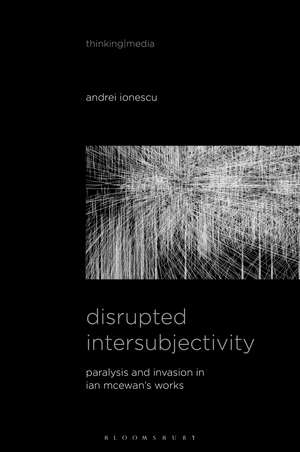Disrupted Intersubjectivity: Paralysis and Invasion in Ian McEwan’s Works: Thinking Media
Autor Dr. Andrei Ionescuen Limba Engleză Paperback – 29 dec 2021
| Toate formatele și edițiile | Preț | Express |
|---|---|---|
| Paperback (1) | 196.08 lei 43-57 zile | |
| Bloomsbury Publishing – 29 dec 2021 | 196.08 lei 43-57 zile | |
| Hardback (1) | 654.69 lei 43-57 zile | |
| Bloomsbury Publishing – 10 iun 2020 | 654.69 lei 43-57 zile |
Din seria Thinking Media
- 23%
 Preț: 198.93 lei
Preț: 198.93 lei - 23%
 Preț: 193.62 lei
Preț: 193.62 lei - 30%
 Preț: 537.78 lei
Preț: 537.78 lei - 30%
 Preț: 538.77 lei
Preț: 538.77 lei - 22%
 Preț: 258.33 lei
Preț: 258.33 lei - 13%
 Preț: 257.76 lei
Preț: 257.76 lei - 22%
 Preț: 239.59 lei
Preț: 239.59 lei - 14%
 Preț: 183.70 lei
Preț: 183.70 lei -
![Eigenvalue: On the Gradual Contraction of Media in Movement; Contemplating Media in Art [Sound Image Sense]](https://i2.books-express.ro/bs/9781501363177/eigenvalue.jpg) Preț: 222.84 lei
Preț: 222.84 lei - 22%
 Preț: 226.97 lei
Preț: 226.97 lei - 21%
 Preț: 215.88 lei
Preț: 215.88 lei - 24%
 Preț: 196.36 lei
Preț: 196.36 lei - 24%
 Preț: 195.03 lei
Preț: 195.03 lei - 23%
 Preț: 199.91 lei
Preț: 199.91 lei - 24%
 Preț: 189.87 lei
Preț: 189.87 lei - 23%
 Preț: 192.55 lei
Preț: 192.55 lei - 23%
 Preț: 191.67 lei
Preț: 191.67 lei - 23%
 Preț: 193.87 lei
Preț: 193.87 lei - 30%
 Preț: 537.37 lei
Preț: 537.37 lei
Preț: 196.08 lei
Preț vechi: 256.96 lei
-24% Nou
Puncte Express: 294
Preț estimativ în valută:
37.53€ • 40.78$ • 31.55£
37.53€ • 40.78$ • 31.55£
Carte tipărită la comandă
Livrare economică 21 aprilie-05 mai
Preluare comenzi: 021 569.72.76
Specificații
ISBN-13: 9781501391149
ISBN-10: 1501391143
Pagini: 224
Dimensiuni: 140 x 216 mm
Greutate: 0.25 kg
Editura: Bloomsbury Publishing
Colecția Bloomsbury Academic
Seria Thinking Media
Locul publicării:New York, United States
ISBN-10: 1501391143
Pagini: 224
Dimensiuni: 140 x 216 mm
Greutate: 0.25 kg
Editura: Bloomsbury Publishing
Colecția Bloomsbury Academic
Seria Thinking Media
Locul publicării:New York, United States
Caracteristici
Introduces the concepts of paralysis and invasion to be used in literary studies as categories for critical reading in order to clarify the structure of social encounters in a large variety of literary works from different genres, historical periods, and cultural backgrounds
Notă biografică
Andrei Ionescu is a Staff Writer at Earth: Nature, Science, Life (www.earth.com). He holds a PhD from the University of Padua, Italy, and conducted postdoctoral research at the University of Bucharest, Romania, Ghent University, Belgium, and Princess Nourah bint Abdulrahman University, Saudi Arabia. Ionescu's areas of research include cognitive and medical humanities, posthumanism, animal studies, and ecocriticism.
Cuprins
1. Introduction: Ian McEwan's Intuition Pumps1.1. Theoretical and Methodological Framework1.2. Forms of Intersubjectivity1.3. Blindness and Insight in Contemporary Cognitive Scientific and Philosophical Accounts of Intersubjectivity2. Sexual Breakdowns2.1. A Brief Look at Sexuality in Ian McEwan's and D.H. Lawrence's Works2.2. Blood-Knowledge as a Vestigial Form of Primary Intersubjectivity2.3. One of the Most Desolate Couplings Known to Copulating Humanity: Homemade Sexual Initiation2.4. Always Bound by History and Our Guilty Natures: Sexual Failure on Chesil Beach2.5. The Success of Failure, or the Heuristic Potential of McEwan's Works in Understanding Sexuality3. Clashes of Worldviews3.1. Science vs. Religion vs. Art in McEwan's Works3.2. In a Mess of Their Own Unmaking: Enduring Love's Paralytics3.3. Their Fatal Lack of Cooperation: Corrupted Teamwork in Enduring Love3.4. The Dangers of Monomaniac Worldviews4. Coda4.1. The Hermeneutic and Heuristic Potential of the Concepts of Paralysis and Invasion4.2. Topics for Further ResearchBibliographyIndex
Recenzii
This cognitive thematic reading of Ian McEwan's fiction is a sympathetic and enlightening approach to several of the author's novels, importantly enriched by Ionescu's scrupulous application of philosophical and cognitive theories. His exhaustive attention to a very broad range of sources in philosophical and scientific epistemological theory makes the book more than a reading of a single author, but also a reference source for the interdisciplinary field of cognitive literary theory and criticism. The combination of wide and responsible reading in ancillary fields of study with McEwan's well-known and well-respected fiction makes this book a good place for readers new to this growing area of literary study to begin learning about it.
This book makes a striking and welcome addition to the burgeoning field of cognitive literary studies. Ionescu reads Ian McEwan's fiction with great sensitivity, critical acumen, and a sure grasp of recent developments in and around that field. His chosen descriptive-diagnostic categories of 'paralysis' and 'invasion' are introduced and applied to revelatory effect, along with his shrewd deployment of ideas from philosophy of mind, epistemology and cognitive science. Above all Ionescu has the gift of moving easily between textual commentary and philosophical meta-commentary, a way of reading that brings numerous insights and a rare depth of critical grasp. While avoiding any risk of invasive treatment - to adopt his own term - this study addresses a complex body of fictional work with the utmost intelligence and care.
This book makes a striking and welcome addition to the burgeoning field of cognitive literary studies. Ionescu reads Ian McEwan's fiction with great sensitivity, critical acumen, and a sure grasp of recent developments in and around that field. His chosen descriptive-diagnostic categories of 'paralysis' and 'invasion' are introduced and applied to revelatory effect, along with his shrewd deployment of ideas from philosophy of mind, epistemology and cognitive science. Above all Ionescu has the gift of moving easily between textual commentary and philosophical meta-commentary, a way of reading that brings numerous insights and a rare depth of critical grasp. While avoiding any risk of invasive treatment - to adopt his own term - this study addresses a complex body of fictional work with the utmost intelligence and care.
